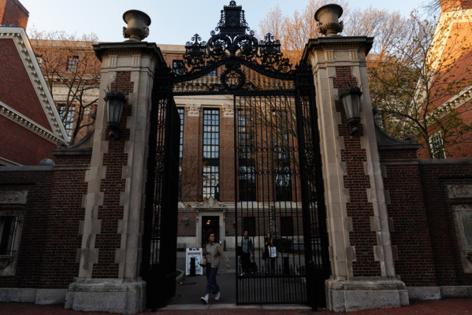Judge in Harvard case questions legality of $2 billion fund freeze
Published in Political News
A federal judge in Boston cast doubt on the legality of the Trump administration’s termination of more than $2 billion in federal research funding for Harvard University over alleged institutional failures including antisemitism on campus.
In a hearing Monday, U.S. Judge Allison Burroughs raised questions about the constitutionality of the government’s decision to slash the funding and called some of their arguments in defense of the move “mind boggling.” She pushed back in particular on the administration’s claims that the funding cuts were justified by Harvard’s failure to tackle antisemitism.
“There are limits to what you can terminate, and why, and how,” Burroughs said to Justice Department lawyer Michael Velchik during the hearing. “It seems to be your idea that you can terminate a contract even if the basis for termination is a constitutional violation.”
President Donald Trump has made Harvard the main target of his effort to force universities to reshape higher education by cracking down on alleged antisemitism, removing perceived political bias among the faculty and eliminating diversity programs. Harvard’s lawsuit alleges Trump’s move violates the First Amendment right to free speech.
The Trump administration announced earlier this year that it was scrutinizing billions in federal grants and contracts to Harvard. The government has also threatened Harvard’s tax-exempt status and tried to prevent international students from enrolling.
Velchik said at the hearing that he attended Harvard and considered it to be the best place to get an education. But he repeatedly echoed Trump’s argument that the school “exhibited a wanton disregard for antisemitism” during campus protests against Israel’s war in Gaza.
“I am both Jewish and American so I hear what you are saying,” the judge said.
No decision yet
Both sides of the case have asked Burroughs to issue final rulings in their favor without a trial, an action known as a summary judgment. The judge ended the hearing without ruling and said she hadn’t yet made a decision on the release of the funds.
The hearing came about a month after Trump said in a social media post that the administration was nearing a deal with Harvard.
“We are confident that Harvard will eventually come around and support the president’s vision, and through good-faith conversations and negotiations, a good deal is more than possible,” White House spokesperson Harrison Fields said in a statement Monday.
On a social media post on Truth Social Monday, Trump referred to Burroughs as an “Obama appointed Judge” and “an automatic ‘loss’” for the government’s case, but vowed to immediately appeal any ruling against the administration.
“Harvard has $52 Billion Dollars sitting in the Bank, and yet they are antisemitic, anti-Christian, and anti-America,” Trump said in a post. “Much of this money comes from the U.S.A., all to the detriment of other Schools, Colleges, and Institutions, and we are not going to allow this unfair situation to happen any longer.”
After the hearing, dozens of Harvard alumni and professors held a rally outside the courthouse in support of the university, chanting the school’s “Veritas” motto and slogans like “Stand up, fight back!”
John Quackenbush, chair of the biostatistics department at Harvard’s TH Chan School of Public Health, said the funding freeze threatens not only his own research related to cancer and other diseases, but the work of his post-doc researchers, who he said are now being recruited by foreign institutions.
“The drain on the future of American research is something none of us should stand for,” he said.
Government demands
During the hearing, Burroughs heard arguments by lawyers for the university and a group of professors, who argued that the funding freeze was unlawful and unconstitutional.
U.S. lawyers claim the Trump administration properly froze funding because Harvard failed to curb antisemitism on campus, particularly after the Israel-Hamas war erupted in October 2023. They said Trump rescinded grants because Harvard no longer complied with Trump’s policy of combating antisemitism.
“Harvard should have read the fine print,” Velchik said during the hearing, arguing that the government can terminate grants at any time if a university is not aligned with its priorities.
The school claims Trump retaliated when it rejected government demands to control its governance, curriculum and the viewpoints of faculty and students.
“In some ways you’re justifying the conduct on protecting Jews and upholding American values but on the other hand taking steps that are antithetical to those things,” Burroughs said at the hearing.
Later, at the end of the hearing, the judge told Velchik that she hoped nothing had been said that would appear to diminish anyone’s concerns about antisemitism.
“This is obviously a very fraught and emotional topic,” she said.
_____
With assistance from Janet Lorin and Akayla Gardner.
_____
©2025 Bloomberg L.P. Visit bloomberg.com. Distributed by Tribune Content Agency, LLC.

























































Comments